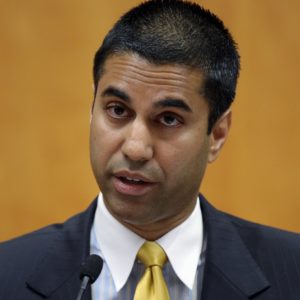The newly Republican-controlled Federal Communications Commission is reining in net neutrality by excusing small internet providers from transparency requirements that include divulging hidden fees to subscribers.
Under a new proposal circulated to commissioners, enhanced transparency rules passed as part of the FCC’s 2015 net neutrality rules would no longer apply to internet service providers (ISPs) with 250,000 or fewer subscribers, the agency reported at the start of the weekend.
Chairman Ajit Pai circulated an order to waive the requirement for five years, exempting predominantly small and rural broadband providers from disclosing monthly data charges, promotional rates, data caps and network performance. Those include what consumer groups describe as hidden fees often associated with modem rentals, maintenance, activation or termination surcharges.
The order marks Pai’s first action on net neutrality since being tapped by Trump to take over the agency this month. Pai’s Republican colleague, Commissioner Michael O’Rielly, has already voted for the order while the agency’s only remaining Democrat, Mignon Clyburn, has yet to vote on the measure.
Regardless of how she votes, the exemption’s passage is assured, marking Republicans’ first use of their 2-1 majority to begin rolling back net neutrality.
The two pledged to “revisit” the Open Internet Order both Republicans voted against in 2015 “as soon as possible” earlier this month.
“Federal regulations has a disproportionate effect on small businesses – businesses that are often the linchpin of a more competitive marketplace and that don’t necessarily have compliance resources,” Pai said in a Friday statement. “I remain hopeful that the full commission will adopt this bipartisan compromise swiftly.”
The order comes after a similar exemption for subscribers with 100,000 or fewer subscribers extended twice by former FCC Chairman Tom Wheeler expired in December. Wheeler recirculated the exemption for renewal, but Republicans disagreed on the size of businesses that should be exempted.
“That lapse left thousands of our nation’s smallest and most competitive internet service providers – mom-and-pop wireless internet service providers, small cable operators, municipal broadband providers, electric cooperatives, rural telephone companies, and others – worried that they would be subject to unnecessary, onerous, and ill-defined reporting obligations,” Pai said.
Republicans’ exemption mirrors bipartisan legislation proposed by the House Energy and Commerce Committee. Small network operators testified before the committee last year, saying they lack the resources larger providers like Comcast or Verizon can spend to ensure compliance. Forcing them to spend limited resources to comply with the rules, they explained, would prevent them from expanding and improving their networks.
The pro-net neutrality group Public Knowledge opposes the legislation, arguing smaller ISPs could take advantage of the exemption by acting as unregulated monopolies in small rural areas where many consumers often only have a single option for service.
The House of Representatives passed the bill unanimously last year.
Sen. Ed Markey, who sits on the Senate committee overseeing the FCC, criticized the proposal Friday.
“I believe that all consumers and all businesses, no matter where they reside, should have access to the most basic and fundamental information about the broadband service for which they pay,” Markey said. “It is unacceptable that small shops and stores will pay for broadband without knowing all the commercial terms of the service.”
The statement is the latest pushback by the Massachusetts Democrat against attempts to unwind Wheeler’s agenda. His Democratic colleague Sen. Joe Manchin of West Virginia has sponsored legislation matching the House bill in the upper chamber.

